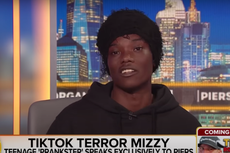Piers Morgan vs the ‘TikTok troublemaker’: who was the winner of this epic TV showdown?
Morgan and Mizzy are both masters of feeding the runaway content economy — but the desire for attention has obliterated people’s sense of what’s right and wrong

Why’s everyone in a tizzy about Mizzy?
After watching Piers Morgan belligerently hector the online prankster on his talk show last night, telling the 18-year-old “TikTok Terror” he is “a product of his upbringing”, it’s easy to lose sight of why the poor young man (real name: Bacarai-Bronze O’Garro) is in the spotlight.
Well, here’s the rub: in his now-deleted videos, which went viral on TikTok before his accounts were suspended, he waltzes through the unlocked door of a stranger’s house and lounges on their sofa. He rips up books in a public library. He pretends to steal a woman’s dog by grabbing it and running away. He tries to leapfrog over the shoulders of orthodox Jews in north London. He even asks women at a tube station late at night if they “want to die”.
Can you imagine trying something like this in America? You’d imagine his career would be a very short one indeed.
Mizzy himself doesn’t seem too contrite. “Make sure you share this everywhere!” he said to the camera as he was bundled away by police earlier in the week. (The Metropolitan Police has confirmed it has arrested an 18-year-old man “on suspicion of causing a public nuisance”. He was issued with a criminal behaviour order and fined hundreds of pounds in court.)
And in an earlier, since-deleted video, he explains: “I don’t let things affect me because you guys are on social media giving me what I want... you’re commenting on all these videos, you’re engaging, you’re posting me more, sharing me everywhere.”
The irony of Piers Morgan grilling Mizzy isn’t lost on us – both are familiar with feeding the engine of outrage. Speaking to the Independent, Mizzy said he noticed that if he had “upped the ante and did wilder videos” he would garner more online engagement – so that is what he continued to do.
“Controversy, even though it’s not good, is the best way to blow up on social media,” he said. “I always know outrage is going to happen. I know exactly what I’m doing and the consequences of my actions.” He added: “I tell people not to reciprocate what I’ve done.”
What all this shows, though, is that the online world has produced incentives for action that are wildly out of kilter with what we’re used to. Offline, there are all sorts of social codes and ethical nuances that guide our behaviour – guardrails that stop us careering off a cliff. Be nice to your boss, because they could sack you. Give up your seat on the bus to an old lady, because she needs it more. Don’t walk through the unlocked door of a stranger’s home, because why on earth would you?
But online, the only currency is attention, and the more you have of it, the richer you become. This isn't necessarily a bad thing: look at all the delightful videos of cats, elaborate cakes and whizzy DIY projects on social media. The problem is that moral value is simply irrelevant. Good things can make good content, and bad things can make good content. And as Mizzy has discovered, it’s often easiest to create good content by doing bizarre, shocking and quite demonstrably wicked things.
There is far, far worse stuff online than his videos, of course. But the unsettling thing about content creators, particularly the younger ones who’ve never known a life without the internet, is not that they have contempt for the usual offline rules – but that those rules simply mean nothing to them. Remember last summer’s “Gentleminions” craze, where hordes of teenagers wearing suits and throwing bananas ran amok in cinemas screening the latest Minions film? It was disrespectful to staff and other viewers, but people found it hilarious. It was happening to someone else, somewhere else. Crucially, it was a performance: all the world’s a stage, and all it’s people merely players. Until, that is, it happens to you.
Our Twitter-brained politicians are especially susceptible. The Tory MP Paul Scully’s first response to Mizzy’s exploits was to tweet that “as soon as the Online Safety Bill goes [through] the hosting of this video will be illegal”. This is a man running to be Mayor of London: his concern should be why someone can get away with the behaviour it depicts in a city he wants to run — not that they’d film it and slap it online.
We might be horrified by Mizzy’s videos, we can’t deny that they illustrate a real problem with our post-internet society. Our desire for attention has completely obliterated our sense of right and wrong. But nothing happens in a vacuum. We’ve spent thousands of years developing ways to get along with each other in the physical world; now we have to make sure the digital one, a world we’ve been stumbling around for just a couple of decades, doesn’t collapse into it and throw everything out of whack. Pranksters and politicians alike need to remember that they’re two very different places. It is no laughing matter.
Join our commenting forum
Join thought-provoking conversations, follow other Independent readers and see their replies
Comments


Bookmark popover
Removed from bookmarks